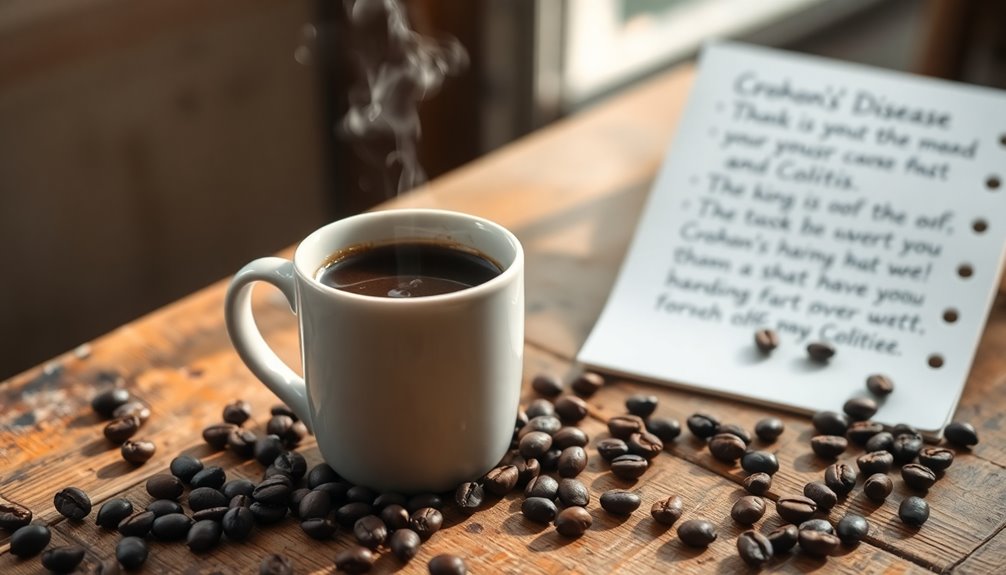Coffee plays an important role in your mental health. Regular consumption can lift your mood and reduce the risk of depression and anxiety. Drinking 2-3 cups daily is linked to significant cognitive benefits, like improved memory and lower chances of cognitive decline. However, too much coffee can heighten anxiety and disrupt sleep, which can worsen mood disorders. It’s vital to find balance in your caffeine intake to enjoy these benefits while minimizing risks. If you want to know more about optimizing your coffee habits for mental wellness, there’s plenty more to explore.
Key Takeaways
- Moderate coffee consumption (2-3 cups daily) is linked to reduced risks of depression and anxiety in both men and women.
- Caffeine enhances alertness by blocking adenosine receptors and boosting dopamine flow, contributing to improved mood.
- Excessive caffeine intake can lead to increased anxiety, sleep disruption, and withdrawal symptoms, negatively impacting mental health.
- Regular coffee drinkers experience better cognitive function and lower risks of cognitive decline associated with memory disorders.
- Understanding caffeine’s effects is crucial for optimizing mental health treatment, especially regarding its interaction with psychiatric medications.
Caffeine and Its Cultural Impact

Caffeine and Its Cultural Impact
In today’s fast-paced world, caffeine has become an integral part of daily life for many people, especially in cultures that celebrate its stimulating effects. You might find yourself reaching for that cup of coffee to kickstart your morning or to stay alert during long hours of study or work.
With around 80% of American adults consuming caffeine daily, it’s clear that coffee consumption has woven itself into the fabric of everyday life, particularly among students and professionals. The variety of coffee available, including single-origin blends and flavored options, adds to its allure and encourages exploration among enthusiasts numerous varieties available. The history of medicinal coffee dates back centuries, with its use as a stimulant and remedy for various ailments well-documented in cultures around the world. In recent years, studies have even suggested potential health benefits associated with moderate coffee consumption, further solidifying its place in society. Whether enjoyed for its bold flavor, comforting warmth, or potential health perks, it’s no wonder that coffee remains a beloved beverage for millions.
Cultural acceptance of caffeine as a harmless stimulant often overshadows its potential downsides. While you enjoy the buzz, research shows that regular coffee consumption can be linked to improved mental health outcomes. For instance, studies indicate that women who drink coffee regularly may face a 20% reduced risk of depression, while men who consume 2-3 cups daily could see a 50% lower risk of suicide.
However, it’s important to remember that caffeine’s addictive properties and potential for dependence are frequently overlooked. Balancing the benefits with the risks is essential as you navigate your relationship with this popular psychoactive substance.
Cognitive Enhancements From Coffee

When you sip your coffee, you’re not just enjoying a warm beverage; you’re boosting your cognitive performance and mood.
Different brewing methods, such as the French press, not only influence flavor but can also affect caffeine content, enhancing alertness even further.
Studies show that caffeine can enhance alertness and even help protect your long-term memory.
With regular consumption, you might notice a positive shift in how you think and feel throughout the day, especially when you consider the benefits of coffee culture.
Cognitive Performance Boost
A cup of coffee can do more than just wake you up; it can enhance your cognitive performance in meaningful ways. Caffeine consumption blocks adenosine receptors, boosting dopamine flow and promoting alertness. This leads to improved cognitive function, especially for habitual coffee drinkers. Research shows that regular coffee intake is associated with a reduced risk of depression and anxiety, providing an additional mental health benefit.
Here’s a breakdown of the cognitive benefits linked to coffee:
| Benefit | Description | Note |
|---|---|---|
| Enhanced Alertness | Increased dopamine flow improves focus and attention | Essential for daily tasks |
| Memory Protection | Caffeine may help slow beta-amyloid production | Potentially inhibits Alzheimer’s |
| Reduced Cognitive Decline | Regular consumption leads to improved function | Particularly noted in women |
| Lowered Depression Risk | 20% reduced risk of depression in women | With 2-3 cups daily |
| Suicide Risk Reduction | 50% reduced risk among men who consume regularly | Important mental health finding |
Incorporating coffee into your routine may not only fuel your day but also contribute positively to your cognitive health.
Mood Enhancement Effects
Many people find that coffee does more than just wake them up; it can greatly boost their mood. Studies show that moderate coffee consumption, typically 2-3 cups daily, is linked to significant mood enhancement effects. For instance, women who drink coffee have a 20% reduced risk of depression, while men see a 50% decrease in suicide risk.
This is largely due to caffeine intake, which enhances alertness and cognitive performance by blocking adenosine receptors and increasing dopamine flow, leading to improved mood and motivation. Additionally, the antioxidants present in coffee may contribute positively to overall health and well-being, much like the benefits of antioxidants found in other beverages.
Regular coffee drinkers often report lower odds of experiencing symptoms of anxiety and depression. In fact, weekly coffee consumption correlates with a notable improvement in mood, reflected in reduced odds ratios for both depression (0.67) and anxiety (0.57). These health benefits highlight caffeine’s potential role in mental well-being.
Furthermore, research indicates that caffeine’s protective effects on mental health warrant further investigation due to its complex relationship with neurotransmitter systems.
Long-term Memory Protection
Coffee isn’t just a mood booster; it also plays a significant role in protecting long-term memory. Regular coffee consumption, particularly through caffeine, shows potential protective effects against cognitive decline.
Research suggests that caffeine interacts with adenosine receptors in your brain, leading to improved memory function and possibly slowing the progression of disorders like Alzheimer’s disease. Additionally, studies indicate that a balanced diet, including certain foods, may complement the cognitive benefits of caffeine, making it essential to reflect on your overall nutrition for brain health natural remedies alongside conventional medications.
In fact, epidemiological studies indicate that caffeine may inhibit beta-amyloid production, a key factor in the development of Alzheimer’s. By enjoying 2-3 cups of coffee daily, you might reduce your risk of depression by 20% if you’re a woman, and men could experience a staggering 50% reduced risk of suicide.
These benefits don’t just stop at mood; they extend to long-term cognitive health. Long-term coffee drinkers tend to experience less cognitive decline and enhanced memory function, showcasing coffee as more than just a temporary pick-me-up.
Mental Health Risks of Overconsumption

Overconsuming caffeine can lead to heightened anxiety and agitation, making it tough to stay calm.
Additionally, certain essential oils, such as lavender oil, are known for their calming effects that may help counteract these symptoms.
It can also disrupt your sleep, exacerbating mood issues and creating a cycle of dependency and withdrawal symptoms.
Recognizing these risks is vital for maintaining your mental well-being.
Anxiety and Agitation Risks
Excessive caffeine intake can lead to significant mental health risks, particularly in the form of anxiety and agitation. When you consume more than 400 mg of caffeine daily—about five cups of coffee—you may notice increased anxiety levels and even panic attacks.
Individuals with pre-existing anxiety disorders, such as those with Borderline Personality Disorder (BPD), are especially sensitive to these effects. The risks of caffeine don’t stop there; the interference with sleep patterns can leave you feeling restless, contributing to depressive symptoms and mood disturbances.
Moreover, caffeine withdrawal can further complicate your mental health. You might experience headaches, fatigue, and even symptoms of depression when you cut back on caffeine. This withdrawal can make it harder to function in daily life, adding a layer of stress on top of your existing anxiety.
To maintain your mental well-being, it’s important to limit your caffeine intake. By doing so, you can mitigate the risks of caffeine-induced anxiety and agitation, leading to better overall mental health.
Always consider how your caffeine habits impact your mood and be mindful of the potential consequences.
Sleep Disruption Effects
Caffeine’s impact on your sleep can be profound, especially when you consume it too close to bedtime. If you drink coffee within six hours of sleeping, you’re likely to experience significant sleep disruption. Caffeine delays the onset of melatonin, making it harder for you to fall asleep and maintain a healthy sleep cycle.
This lack of quality sleep can exacerbate insomnia, leading to increased anxiety and mood disorders. Incorporating practices like gentle stretching before bedtime can help counteract some of these effects and promote relaxation before sleep.
When you’re not getting enough rest, your mental health suffers. Insomnia linked to excessive caffeine can intensify feelings of sadness and amplify anxiety, creating a vicious cycle that’s tough to break.
If you already struggle with mood disorders, the effects can be even more pronounced. The combination of poor sleep quality and high caffeine intake raises your risk of developing depressive symptoms over time.
Regularly sacrificing sleep for caffeine can diminish your overall well-being, making it essential to monitor your intake. Prioritizing sleep is vital for maintaining mental health, and cutting back on caffeine might just be the key to achieving better rest and stability in your mood.
Dependency and Withdrawal Symptoms
Many people don’t realize how quickly dependency on caffeine can develop, often leading to negative mental health effects. Caffeine use disorder can manifest when you find it hard to quit or cut back on your intake, despite experiencing uncomfortable withdrawal symptoms. These symptoms can include headaches, fatigue, and even feelings of depression, making it tough for you to function daily.
Additionally, regular caffeine consumption may interfere with stress management techniques, which are essential for maintaining mental well-being.
The severity of withdrawal syndrome often catches users off guard. Since caffeine is widely accepted and doesn’t seem as harmful as other substances, you mightn’t recognize your dependency until you try to reduce your consumption. The DSM-5 acknowledges caffeine use disorder, highlighting the importance of understanding its mental health implications further.
If you consume more than five cups of coffee daily, you might face increased risks of anxiety, agitation, and insomnia. These effects can exacerbate any existing mental health issues, making it vital to monitor your caffeine intake carefully.
Being aware of caffeine’s addictive properties can help you maintain a healthier relationship with coffee and prevent the adverse psychological effects associated with overconsumption.
Optimal Caffeine Consumption Strategies

Optimal Caffeine Consumption Strategies
Timing your caffeine intake strategically can greatly enhance its benefits for mental alertness and overall well-being. To maximize the positive effects of coffee consumption, delay your first cup for at least one hour after waking. This allows your cortisol levels, which peak in the morning, to decline, making caffeine more effective.
Understanding your personal budget for caffeine can help you manage consumption. The ideal timing for caffeine intake is mid-morning or early afternoon; this way, you boost alertness without disrupting your sleep later.
Instead of consuming large doses of caffeine, aim for small, frequent doses. Taking in 20 mg to 100 mg at a time can lead to better functional effects, enhancing your mental health.
It’s also crucial to track your daily caffeine intake, ideally limiting it to about two 8-ounce cups of coffee. This awareness helps you manage potential dependency and avoid unpleasant side effects.
If you find yourself needing to reduce caffeine, do so gradually. Abrupt changes can lead to withdrawal symptoms, making the shift uncomfortable.
Research Findings on Coffee and Mental Health

Research on coffee and mental health reveals compelling connections between caffeine consumption and psychological well-being. A study involving 3,362 adults in Isfahan, Iran, found that those who consumed coffee weekly had lower odds of experiencing depression (OR 0.67) and anxiety (OR 0.57).
Notably, just as dogs benefit from healthy dog snacks to promote their well-being, regular coffee drinkers reported symptoms of depression at 28%, psychological distress at 22.6%, and anxiety at 13.3%. This suggests a potential link between coffee intake and improved mental health outcomes.
Epidemiological studies indicate that drinking 2-3 cups of coffee daily can correlate with a 50% reduced risk of suicide among men. Additionally, research suggests that caffeine may protect against cognitive decline by slowing beta-amyloid production, which is tied to memory disorders like Alzheimer’s.
Remarkably, regular coffee consumption is associated with a 20% reduced risk of depression in women, highlighting caffeine’s potential mental health benefits.
These findings emphasize the importance of coffee as more than just a morning ritual; it might play a significant role in enhancing your mental health and combating issues like depression and anxiety.
Understanding Caffeine Use Disorders

Caffeine’s allure can sometimes lead to dependency, manifesting as caffeine use disorder. This condition is characterized by a persistent desire to consume caffeine and difficulty controlling your intake. When you try to cut back, you might experience withdrawal symptoms like headaches, fatigue, and irritability, which can severely impact your daily functioning and mental health.
Philosophical exploration of dependency can encourage deeper self-reflection on personal choices regarding caffeine consumption. The DSM-5 recognizes caffeine use disorder, highlighting its potential for dependency, despite caffeine’s cultural acceptance as a harmless stimulant.
If you have heightened sensitivity to caffeine, particularly if you struggle with anxiety disorders, you may find that even small amounts can exacerbate your symptoms. It’s essential to monitor your caffeine intake, as the psychological effects of dependency can lead to a cycle of increased consumption and worsening withdrawal symptoms.
Recent studies stress the importance of further research to understand the prevalence and mechanisms behind caffeine use disorder. This knowledge could help develop effective strategies for reducing caffeine consumption and mitigating its negative impacts on mental health.
Recognizing the signs of this disorder is the first step towards regaining control and improving your overall well-being.
Implications for Mental Health Treatment

Understanding how caffeine impacts mental health treatment is essential, especially for those dealing with psychiatric conditions. Caffeine consumption can notably alter the metabolism of psychiatric medications through the cytochrome P450 system. This alteration may affect medication efficacy and dosage requirements, leading to potential symptom relapse if caffeine lowers the levels of these drugs in your system.
Conversely, higher medication levels can occur due to caffeine’s inhibition of enzyme production, resulting in adverse effects that complicate your treatment strategy. It’s important to monitor your caffeine intake, as limiting it might enhance your focus on therapy and recovery. Many patients report improved mental clarity when reducing caffeine consumption.
Additionally, caffeine can mimic symptoms of anxiety and panic disorders, complicating accurate diagnosis. A caffeine-free period might be necessary for your healthcare provider to assess mood episodes correctly.
Frequently Asked Questions
Can Quitting Coffee Improve Mental Health?
Quitting coffee might improve your mental health, especially if you experience anxiety or irritability. However, withdrawal symptoms can temporarily worsen your mood, so consider gradually reducing your intake to minimize discomfort and assess your well-being.
Why Is Coffee Good for Mental Health?
Coffee’s beneficial for mental health because it boosts dopamine levels, enhances mood, and reduces anxiety symptoms. Regular consumption can even lower your risk of depression and cognitive decline, making you feel sharper and more energized.
Is Coffee Linked to Depression?
Imagine a warm embrace in a cup; coffee’s potential to lower depression odds might surprise you. Research hints that regular consumption can reduce risks, but it’s not a guaranteed shield against mental health struggles.
What Is the Relationship Between Caffeine and Anxiety?
Caffeine can trigger anxiety symptoms, especially if you’re sensitive to it. If you’re feeling anxious, reducing your caffeine intake gradually might help alleviate those symptoms without the complications of withdrawal.
Conclusion
In the dance between coffee and mental health, moderation is key. While caffeine can sharpen your focus and lift your spirits, overindulgence can lead to a jittery spiral that clouds your mind. By finding your sweet spot in consumption, you can harness the benefits without the pitfalls. As research continues to unfold, understanding your relationship with coffee can be an essential step toward better mental health. So, sip wisely and enjoy the brew that fuels your day!










